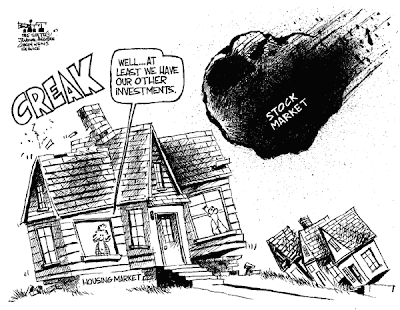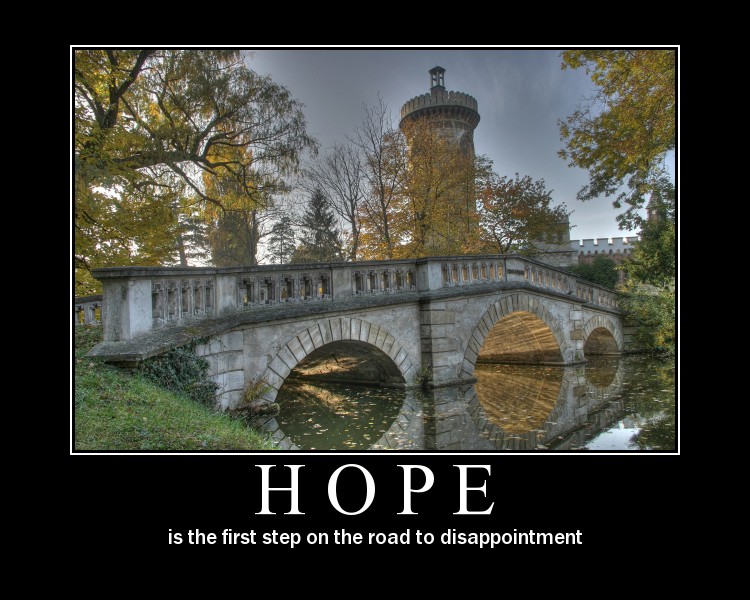Forty percent of the world’s wealth destroyed! Hard to imagine, except we’ve been watching it day after day.
Global Crisis Destroys 40% of World Wealth; Bailout to Hit $4 Trillion
Courtesy of Mish
The past five quarters have seen 40pc of the world’s wealth destroyed and business leaders expect the global economic crisis can only get worse.
Steve Schwarzman, chairman of private equity giant Blackstone, said an "almost incomprehensible" amount of cash had evaporated since the financial crisis took hold.
"Business will be very different," he added.
His comments came on a day of the World Economic Forum characterised by the gloom of its participants and warnings that the crisis will endure for some time. News Corp chief executive Rupert Murdoch kicked off the meetings by warning that the atmosphere was worsening – despite global economic confidence plumbing the lowest depths on record.
"The crisis is getting worse," he said. "It’s going to take drastic action to turn it around, if it can be turned around, quickly. I believe it will take a long time."
Indeed, business will be very different. This is the back side of Peak Credit and its twin sister Peak Earnings.
Inflationists simply do not understand the destruction of bank credit accompanying in conjunction with the decline in asset prices. Nor do they understand the changing attitudes towards debt. This is a once in every 3-4 generational occurrence. Hardly anyone alive has experienced anything but inflation all their lives until about a year or so ago. A rude awakening is at hand.
Pimco Says U.S. Must Buoy Asset Prices for Recovery
Oce again Bill Gross misses the mark by a mile. Please consider Pimco Says U.S. Must Buoy Asset Prices for Recovery.
Policy makers must stop declines in asset prices to revive the U.S. economy in 2010 and curb rising unemployment, according to Bill Gross, co-chief investment officer of Pacific Investment Management Co., the world’s biggest bond fund.
“You can’t bail out everyone, yet economic recovery is not possible unless certain critical asset sectors are not only reliquefied but rejuvenated in price,” Gross wrote in his February investment outlook posted today on the firm’s Web site. “An economic recovery is dependent upon commercial real estate prices stabilizing and more retail stores staying open for business in the months and years ahead.”
Policy makers should purchase municipal bonds, commercial mortgage-backed securities and investment-grade corporate bonds as a “necessary step towards eventual economic revival,” Gross wrote.
It is impossible for government to stop the decline of asset prices except by owning every one of them. Prices will fall to their natural level regardless of intervention.
What Gross is essentially asking for is for the government to guarantee above market prices for the assets PIMCO owns.
Darling Lines Up The Tools
On the other side of the Atlantic Darling Gives BOE Authority on Asset Purchase Fund
The U.K. government gave the central bank authority to spend 50 billion pounds ($71 billion) on bonds and commercial paper and paved the way for the central bank to lift money supply as interest rates keep falling.
Chancellor of the Exchequer Alistair Darling directed Bank of England Governor Mervyn King to buy investment-grade securities as a way of unfreezing financial markets. The bank’s Monetary Policy Committee also will consider using the fund to stimulate the economy, though it will need permission to act.
Britain’s recession is deepening as banks ration credit, shrugging off seven cuts in the central bank’s borrowing costs. The policy, set out in letters between the central bank and the Treasury, marks a first step toward so-called quantitative easing, where governments increase the money supply to reduce its cost and prevent a downward spiral in the economy.
“They’re getting all the tools lined up,” said Matthew Sharratt, an economist at Bank of America Corp. in London. “All you need to do is stop the sterilizations to increase money supply. The mechanics are being set up to move into quantitative-easing proper. It is a rising probability they may be forced into further down the line.”
As I commented in Fed Adopts "Throw The Kitchen Sink" Policy 
Flooding the market with words and throwing the kitchen sink at the problem will not stop the impending wave of failures. In cases of tools vs. tsunamis, the tsunami will win every time.
And after the kitchen sink, it’s straight down the drain thereafter.
The Ever Rising Cost Of The Bailout
Does anyone remember when the cost of the bailout was supposed to be $500 billion? Then $1 trillion? Then $2 trillion, then a whopping leap to $3.6 trillion. It’s time top up the taxpayer ante once again.
Fortune Magazine is reporting Bank bailout could cost $4 trillion
Banks don’t have enough capital to fix their problems, which means the Obama administration may need a lot more money to clean up the financial mess.
The cost of the bank bailout is likely to be much higher than $700 billion.
While the Obama administration hasn’t asked Congress for more money yet, some experts warn that government spending on support for struggling financial services companies will ultimately reach into the trillions of dollars.
"The amount of working capital you’d expect the government to take into this would be around $3 trillion to $4 trillion," said Simon Johnson, a senior fellow at the Peterson Institute for International Economics and author of its Baseline Scenario financial crisis blog.
But calls for a comprehensive response from the government have increased in recent weeks following the free fall of bank stocks.
The KBW Bank index has dropped 35% in January after a 50% plunge in 2008, as investors worry that the government may be forced to nationalize some banks — and wipe out shareholders in the process. Shares of Citigroup (C) and Bank of America (BAC) have been particularly hard hit.
"The big banks are a hope trade right now," Johnson said.
Johnson said the government could get warrants in banks receiving assistance that would convert to common shares once the government sells them. He also said the government could hire private equity managers to oversee the assets the government takes on — and sell them when the time is right.
These arrangements, he said, should allow the Treasury to extract some gains for taxpayers when the economic free fall ends and the banking system starts to recover.
Some observers believe asset values are so depressed right now that as long as the government has a well designed plan that restores investor confidence, taxpayers should profit from the financial bailout
"I think we have seen prices fall to a point where the government could very easily make money, though I’d be very happy if we end up breaking even," says Gary Hager, president of Integrated Wealth Management in Edison , N.J.
I am sorry, there simply is no hope for the "Hope Trade". Citigroup, Bank of America, Wells Fargo, etc are gigantic black holes that will suck in every dollar available. All taxpayers will get, if anything, are a few quarks that escape.
Colin Barr, senior writer for the story goes on to say "If the history of previous banking system rescues is any guide though, there’s also a good chance that removing toxic assets from bank balance sheets could leave taxpayers with a significant tab."
Had Barr written "near certainty" instead of "good chance" and I would have rung the bell and given him a cigar.
And in talking about a possible RTC style bailout, Barr concludes "But whatever method the aggregator bank uses, it could mean significantly higher startup costs than the RTC had. So expect to see the Obama administration coming back to Congress for more money…soon."
Ding, ding, ding, we have a winner. I am ringing the bell for Barr’s final conclusion. That unfortunately, is the sad state of affairs.
Murray Rothbard vs. Tim Geithner
Inquiring minds are considering a 1984 classic by Murray Rothbard entitled Wall Street, Banks, and American Foreign Policy.
Commercial bankers, engaged as they are in unsound fractional reserve credit, are, in the free market, always teetering on the edge of bankruptcy. Hence they are always reaching for government aid and bailout.
My friend "BC" just pinged me with … The banksters hold the marked cards, the politicians are the dealer, and the taxpayers are the patsy in this game. Of course the banks are not just ‘teetering’ anymore. They have actually gone bankrupt.





